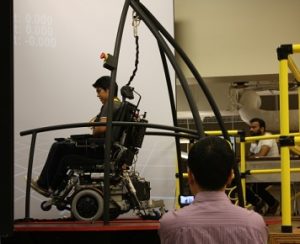
Virginia Tech and the Smithsonian’s National Museum of American History presented the first annual ACCelerate: ACC Smithsonian Creativity and Innovation Festival on October 13-15, 2017. The festival, programmed by Virginia Tech’s Institute for Creativity, Arts, and Technology and the Museum’s Lemelson Center for the Study of Invention and Innovation, was a 3-day celebration of creative exploration and research at the nexus of science, engineering, arts, and design (SEAD). Visitors to the festival interacted with innovators and experienced new interdisciplinary technologies developed to address global challenges. The event was free and open to the public.
The ACCelerate festival was an opportunity for all ACC schools in partnership with the Lemelson Center to showcase their work to the public, each other, students, alumni, companies, legislators, and invited guests from the nation’s capital. McGowan Institute for Regenerative Medicine affiliated faculty member Rory Cooper, PhD, FISA & Paralyzed Veterans of America (PVA) Chair and Distinguished Professor of the Department of Rehabilitation Science & Technology, professor of Bioengineering, Physical Medicine and Rehabilitation, and Orthopedic Surgery at the University of Pittsburgh, and the Founding Director and VA Senior Research Career Scientist of the Human Engineering Research Laboratories (HERL), participated in the event showcasing the Mobility Enhancement Robotic Wheelchair (MEBot).
The MEBot tackles both curbs and challenging terrains. The large center driving wheels can reposition themselves to simulate front-, mid-, or rear-wheel driving. The four smaller caster wheels are controlled with compressed air and move up and down freely and independently.
For climbing curbs, the front caster wheels lift up onto the curb, then the driving wheels lift themselves up and forward onto the curb, which lifts the chair onto the curb. This is done automatically whenever MEBot senses a curb or step. The ultimate goal is for MEBot to climb a set of stairs. The same general function is used to operate on icy or slippery surfaces.
A traditional power wheelchair can get stuck on this kind of terrain. MEBot, however, uses its front and rear caster wheels to inch forward on the slick surface by extending its front casters, moving the seat forward, bringing the rear casters forward, and then repeating the process. Meanwhile, the seat stabilization system keeps the driver safely upright.
The research team includes Dr. Cooper, Brandon Daveler, PhD, Ben Gebrosky, Garrett Grindle, PhD, Andrea Sundaram, Hongwu Wang, PhD, and Jorge Candiotti.
Illustration: MEBot. HERL.
Read more…
University of Pittsburgh Swanson School of Engineering News Release
